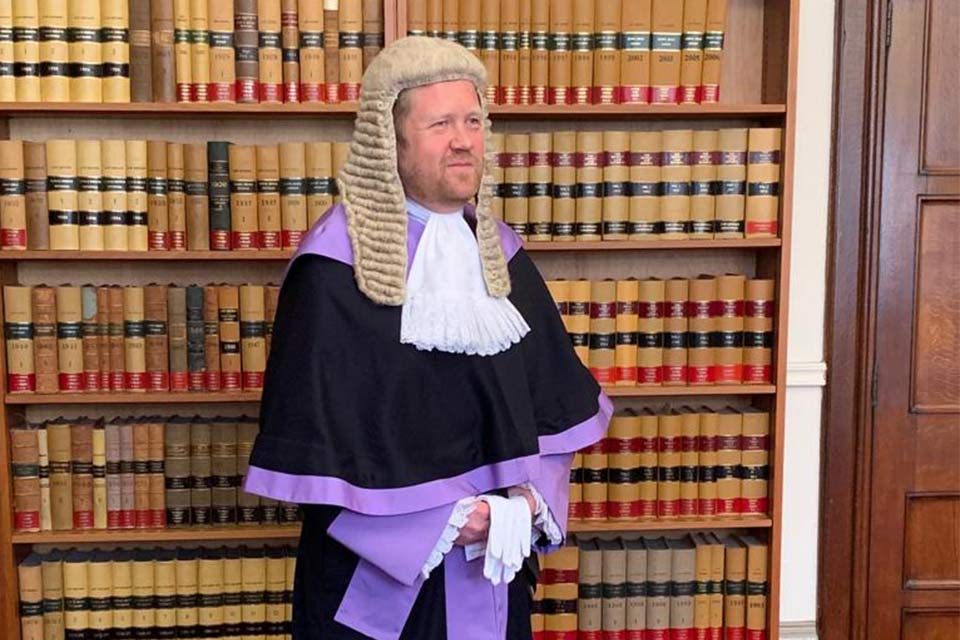His Honour Judge Edward Connell - Crown Court Judge, Ministry of Justice UK
For Edward Connell, the journey to becoming a Crown Court Judge was different compared to many others in the role.

While taking a law degree might seem like an obvious step, Edward studied French & Geography at Keele, and still wasn’t entirely sure what he wanted to do when entered his final year in 1994.
He said: “When I was studying for my degree, in my mind, I thought I would go on to work in international business, or a similar field, with the view that my French degree would be a useful skill to have.
“It wasn’t until I was about to graduate that I started to think more seriously about careers that someone suggested to me, given I liked the idea of public speaking, I should give some consideration to becoming a lawyer or barrister. So I did some work experience and quickly realised it was what I wanted to do, and I set my sights on becoming a barrister.”
Having not studied law at university, Edward took a one-year law conversion course at the College of Law and then trained to become a barrister. He was called to the bar in 1996 and practised exclusively in criminal law, both prosecuting and defending. In 2009 he was appointed a Recorder and then in 2019 he was appointed a full-time Circuit Judge in Crown Court.
Reflecting on his career so far, Edward, said: “At the beginning, I was only interested in being a criminal barrister. Lots of lawyers try to avoid court, and only end up in there if something has gone wrong, but I wanted to be in court every day and I trained to do both prosecution and defence, which wasn’t too common at the time. I can remember when cases I was involved in started to be covered by the media, and that felt like a big moment from a professional point of view.
“I thought I would finish my career as a barrister but in 2009 I became a Recorder, so I would sit part-time as a Judge for up to six weeks a year while also carrying on with my normal job as a barrister. I did that for ten years and in that time I realised where I wanted my career to go, and I was appointed a full-time Circuit Judge in Crown Court in 2019.
“Being a barrister is challenging but it’s a fantastic job at the same time. You get to meet so many people, and no two days are ever the same. It’s also a physically demanding role which can involve being all over the country and a lot of travel, and that can have a negative impact on your work-life balance, which is why I started to think about a career change.”
Edward now sits as a Judge at Isleworth Crown Court, in London, where there are 14 court rooms. He has also been appointed as Diversity and Community Relations Judge and has led on the creation of the newly formed LGBTQ+ Judges Association, which is being officially launched on June 17th (2024) with an event at the Royal Courts of Justice, where the Lady Chief Justice will give the opening speech.
In his spare time Edward is a football referee, campaigns against discrimination in sport, sits on London FA disciplinary tribunals and hosts a podcast called “Coming out the Pod” where he interviews people about their coming out stories.
Edward said: “The most refreshing thing I have seen in my career is the improvement of diversity in the profession. It is still a difficult profession to break into and I had the advantage of being a white male with a private school education, so the typical hallmarks. In the past there weren’t many female and non-white people coming to the bar, but thankfully that is changing now and we’re seeing much more diversity in the judiciary.
“I didn’t tell anyone I was gay until I was quite a senior barrister, because it was a taboo subject back then and it would have impacted on my career. But here we are in 2024 and I have helped to set up the LGBTQ+ Judges Association, and the thought of that group just even existing when I came to the bar would have been impossible. We now have more than 100 members and an official launch event at the Royal Courts of Justice, where the Lady Chief Justice will give the opening address.
“There are still people out there struggling with their sexualities and their careers, and I don’t think there are enough role models. I do feel that if people have the platform and can have influence, then they should take advantage of it if they can. Even now after setting the group up, we received an email from someone who said they were gay but have never been open about it at work because they were worried about their career, so hopefully we can encourage and empower people to be who they are.”

